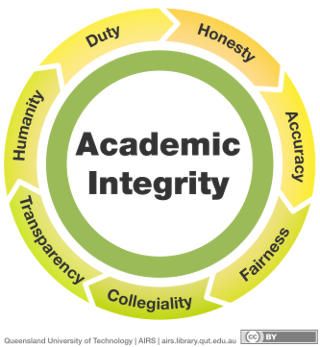a) Forms of Academic Dishonesty
There are varied forms of academic dishonest; they include committing plagiarism, academic bribery, committing misrepresentation, cheating, and not limited to committing fabrications. This paper examines bribery, plagiarism and duplicate submission in depth.
To begin with, duplicate submission involves submitting same paper a number of times to earn academic credit. It could either be for class work purposes or even examination purposes. For instance, where answers have already been provided for a term paper, submitting the same paper to earn may marks for examination credit is academic dishonesty. This could happen in a case where an instructor is not aware that the same paper had been submitted before, especially where we might have change of lectures/instructors in the same academic year. Student should not take advantage of the ignorance of their lectures to double submit assignments.
Plagiarism is termed as the most common form of academic dishonesty (Plagiarism Academic Integrity, 2019). It involves adopting other person’s arguments and passing them as yours. It is mostly identified when these stolen ideas are used without attributing them to their sources. Academicians intend to pass them as their own original thoughts when in essence they have committed an academic theft. A person’s original ideas are under protection of copyright right laws and so, yes, they can be stolen. When this happens an academician is said to have committed plagiarism. Plagiarism ranges from: ignoring quotation marks when they are needful, copying ideas and not giving credit where due, submitting a persons work and claiming ownership, and even, where writers change words but retain the structures of sentences.
Bribing, as well, when done for academic purposes, passes as academic fraud. This could be done either by students or by the instructors. Either, the students bribe to get academic favours or the college professors or school teachers give academic advantages to students in order to gain favours from them (Altbach, 2019). A student, for instance, could offer an instructor money, food stuffs, sexual favours in exchange for good grades or what other academic favours they can get from the dons. The second involves the academic professor/teacher initiating the fraud by advancing the grade or academic favours for a certain favours from the student.
In conclusion, academic fraud should be condemned, any sort of it. Students should be encouraged to comply to all academic code of conduct and adhere to all academic ethical standards. They form the future and are the leaders of tomorrow and should learn to leave honestly right from class.

b) Five Strategies that Help Reduce Exam Anxiety
Exam anxiety involves feeling fear filled or even panic when about to sit for exams. By their nature, exams are likely to elicit anxiety among candidates. This does not happen to only those who are not prepared, but even to those who feel fully prepared; just as it does, stage fright to all speakers. As a candidate, one has to fully acquaint themselves with all strategies that help them overcome exam anxiety, so that they choose what works for them. This paper is going to discuss in depth five strategies that help overcome anxiety prior to exams. It also provides demonstration of how I would apply each strategy during an examination period.
To fight anxiety as a student awaiting an exam, I would ensure I study well, at regular intervals and even, if possible from the same place. This helps in remembering of ideas studied as I associate them to the environment from where studying is done. Also ensures that the mind does not have to cope with new environment and new surroundings every time I get down to study. Some commonness in time and routine helps the mind fight stress.
Lack of sleep could cause anxiety. To fight this, I would ensure that I get enough sleep. I will organize myself to study in time to ensure that when sleeping, does not always feel like I am committing a crime. Researchers argue that there is interrelatedness between good sleep and good performance. As a student awaiting an exam therefore, I would ensure that, I get enough of it`
If anxiety cannot be controlled by natural circumstances I would the see a counsellor. Due to the training in their profession, they are able to examine me and offer sufficient counselling that will see me sit for my exams without stress. This could either be a professional counsellor, my teacher or even my class-peer-counsellor, whom I feel are well qualified to lead me out of the anxiety. The peer counsellor should not be facing the same exams as me. Talk therapy is very efficient and once I talk out about my exam’s fear, I will feel relieved.
Getting exercises also helps fight anxiety. Exercising initiates, a relaxation in us and helps release tension. This exercise could be taking short walls with friends or my classmates as well as taking deep breathes and other exercise that help us relax our muscles. This could even involve dancing to our lovely music. Anxiety emanates from a hard day’s work and relaxation techniques could help do away with this fear.
Another way to fight anxiety is by Fueling your brain by eating and drinking sufficiently. The body needs to be energized in order to fight the fear that comes from within. If waiting for an exam, I would make sure that I eat sufficiently and as well, I will not overeat. On the day of the test, I would drink a lot of water. As well I would avoid all sugary foods as they also boost anxiety levels (Racheal, 2019). Good food will help my body calm down as well as provide the required energy to write the exam.
It is thus very important to learn some strategies that could help you fight anxiety. This is applicable to everyone since as I stated in the beginning any one can find themselves anxious at the face of exams.






